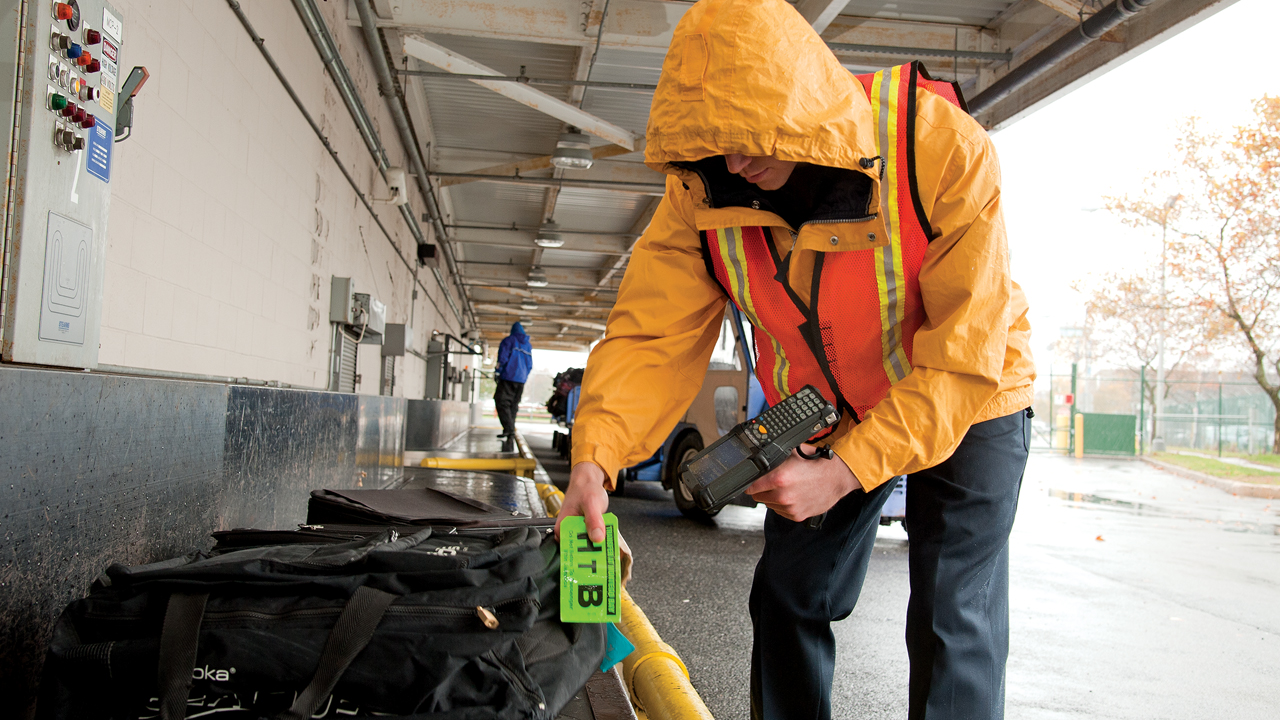
Travelers’ Next Technology Destination? Smarter Baggage Tracking
In 2018, approximately 25 million bags were lost or mishandled by airlines worldwide. That’s 15 million fewer bags than were reported “mislaid” a decade earlier. Though some may view this decline as a win, this is clearly not a statistic that the owners of last year’s 25 million lost bags would likely celebrate. If anything, it serves as a stronger call to action.
Budget travel is enabling more travellers to take to the skies for the first time in a long time, putting renewed pressure on airline infrastructure across all regions. Though, the risk of lost luggage is currently most prevalent in Europe, where an average of 7.3 bags were lost per 1000 passengers in 2018, compared with 2.85 in North America and 1.8 in Asia.
As people look to travel more and visit destinations further from home, airports and airlines alike must act swiftly to lessen the risk of baggage loss, or they risk dampening customers’ overall experience. Lost baggage is a frustrating prospect for travellers and bad business for airlines and airports, especially the smaller ones. Tourism is surging in remote destinations mostly served by budget airlines who are simultaneously experiencing a rush of growth. While this is a positive trend, the infrastructure in place today in these isolated destinations is very basic, and many of these low-cost carriers are relying on lean operating models. This makes it hard to manage the increasing traveler and luggage volumes. Even more mature, legacy airline carriers are struggling to introduce new efficiencies to manage demand.
Knowing that adventure seekers are going to continue to enjoy any opportunity to visit these previously inaccessible locations, airlines and airports (of all sizes) need to find a way to end the lost luggage lunacy. Otherwise, the large quantities of lost luggage will overshadow the benefits of these expanded travel options, and this single negative incident in the course of a trip could translate into overall negative ratings for the travel industry as a whole.
So, where do we go from here?
First, we acknowledge the root cause of the problem. Then, we map out a new route to our desired destination: smarter baggage tracking.
Checking Checked Bags
There are several factors that impact lost luggage, including budget cuts, ever-increasing passenger footfall and passengers travelling with multiple bags on transfer flights. Forty-six (46) percent of misplaced bags were lost during flight connections last year. If that weren’t enough, suitcases falling from airport delivery vehicles and going unreported, baggage remaining on the aircraft and unidentifiable lost luggage compound the issue.
In an attempt to curb lost luggage, the International Air Transport Association (IATA) mandated Resolution 753. This four-tracking point regulation, which took effect in 2018, provides guidance on how the location of every checked piece of luggage should be recorded. This tracking journey begins at check-in, when passengers hand over their bags to the airlines.
Many passengers are familiar with the moment in which airline workers apply an automated baggage tag with a barcode sticker, which will generally include a unique 10-digit tag number. This probably won’t change. However, adding a second mandated check of the unique identifier in the loading area can help to ensure the bag is allocated to the right flight once it’s removed from the conveyor belt. This also applies to subsequent checks, with the tag once again recorded when the bag is delivered onto the aircraft; during any transfers; when custody of the bags changes between carriers; and finally, upon arrival, at baggage claim.
At bigger airports, such checks are easier to enforce (of course, not always perfectly). But, smaller airports, those in more remote areas with less mature infrastructure, struggle woefully. Digital automation solutions are not prevalent yet, making process management problematic across so many touchpoints.
All is not lost. More affordable and purpose-built technologies are coming to the rescue. There are several mobile computers, barcode scanners, enterprise printers and RFID systems that airlines and airports can easily roll out, even in remote areas, to eliminate the time-consuming and error-prone manual processes that have contributed to their current “mountain of problems.”
For example, there were 14 airports* in remote Greek Island destinations that had difficulty managing the increase in tourist footfall whilst still complying with the IATA regulation. To boost efficiency and improve customer experience, Zebra helped to automate baggage tracking at each of those airports. By arming workers with enterprise-grade Android mobile computing devices connected to an overarching network, bags are now able to be scanned and identified much faster than before without compromising record accuracy. In fact, if anything, this solution is helping to eliminate the tracking errors that contributed to the high rate of lost baggage. All bag tag scans now link to a central database, giving both workers and passengers increased visibility over every item of luggage checked into the hold at every stage of the passenger journey – and especially during the most critical exchanges that baggage handlers experience on the tarmac when loading and unloading the bags onto and from the aircraft.
The Future of Flight
Whilst arming staff with mobile devices and continuing to digitise the whole travel infrastructure is a great start, travel is continually transforming. Airlines and airports must continue to adopt new, more advanced, technologies that enable them to adapt processes easily, without compounding current issues.
For example, the next logical step would be to integrate artificial intelligence (AI) with the mobile scanners, computers and central terminal or airline databases they’ve deployed to date. They can harness the data continually captured and shared across these devices to start to identify delay-inducing patterns in arrival and departure procedures, baggage handling processes or passenger flows during check-in, security and boarding. Such operational analysis tools could also help the aviation industry collectively predict and react swiftly to unpredictable environmental and human factors that could impact on-time stats, baggage management and more.
Not only that, but open-source-style communication between airlines and airports is paramount to efficiency and safety. Together, mobile computers, tablets, AI and workflow-specific software give airports, airlines and passenger service companies the tools they need to all work together to provide consumers with the best possible experience. These combined technologies further increase visibility of operations, provide real-time status updates and help to anticipate issues so that actions can be taken to pre-empt them. Of course, open-source-style communication between airlines and airports is also paramount to efficiency and safety and, as demonstrated above, the security of luggage.
It doesn’t stop there. If AI and open communication tools were to be combined with mobile-equipped employees, case tagging technologies as well as autonomous delivery vehicles, lost bags would likely become the least of travellers’ worries. Instead, travellers would probably find their bags moved into a carousel by a friendly, efficient airport employee at the time of check-in, transferred to an autonomous delivery vehicle for transport, and offloaded safely at the destination, on time per the originally scheduled flight (even if the actual flight is delayed). To top it off, travellers would receive real-time notifications on their mobile phones confirming that their bags made it to the right place at the right time.
How fast can we get this off the ground, you’re probably asking. Our answer: as fast as airlines and airports decide to move. This is the next destination, after all.
With mobile solutions already in place improving baggage handling and exciting prospects for the future on the horizon, travellers should be open-minded about their next holiday and not worry about whether their bags will arrive, but whether they’ve packed everything they need.
###
Editor’s Note: Read more about what airlines and airports are doing to address growing pains, as well as Zebra’s contributions in the aviation industry, in this BBC article.
###
Ready to transition to a smarter baggage tracking solution but not sure where to start? Or want to make sure you’re taking the right route with your technology? Let’s talk. Connect with us here. Or click through to our Transport and Logistics Solutions guide to learn which technologies may be best suited to address your pain points.
* The Greek airports benefiting from this solution are: Rhodes, Thessaloniki, Santorini, Kos, Mykonos, Corfu, Aktion, Chania, Kefalonia, Lesvos, Samos, Skiathos, Zakynthos and Kavala.

Darren Russell
Darren Russell is Senior Director of the Solution Sales Group at Zebra Technologies. He is responsible for the strategy and management of the solution sales teams focused on delivering Intelligent Edge Solutions to Zebra customers across EMEA. The Intelligent Edge Solution portfolio incorporates Real Time Location Solutions, SmartLens for Retail, SmartPack for Transport & Logistics, Workforce Connect voice and Zebra’s RFID portfolio. Additionally, Mr. Russell is responsible for the Professional and Managed Services sales teams and the Multinational Account Managers who manage Zebra’s largest accounts across the region, including customers with global deployments of Zebra solutions.
Prior to joining Zebra, Mr. Russell was Head of Public Sector Sales at Blackbay, a mobility software organization. In this role, he was focused on delivering software applications that improved field worker efficiency.
Mr. Russell previously served as Regional Sales Manager at both IKON Office Solutions and Thales Telematics, where he led sales teams across the technology managed services and fleet telematics software industries.




